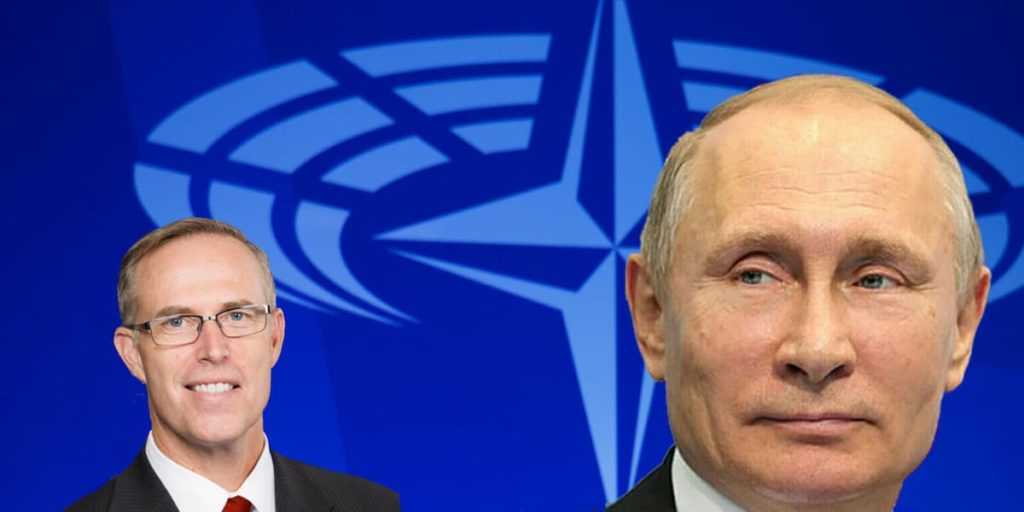Huffman Amendment funds Putin and weakens NATO

Unless the Senate acts quickly in conference, Congress will help Vladimir Putin control the supply of energy to the American military in Germany.
At issue is a floor amendment that Congressman Jared Huffman (D-CA) added to the 2020 National Defense Authorization Act (NDAA) earlier this year, which passed the House of Representatives.
The Huffman amendment will un-do bipartisan agreement to reduce the dependence of the US military in Europe on Russian natural gas.
Huffman misleadingly worded his amendment to sound like an environmentalist fight against pork barrel spending. He ignored the legislative history that proved that the American fuel requirement was intended to defend the US military and NATO allies from a dependency on Moscow.
The Huffman measure, with no co-sponsors, was adopted by voice vote as part of a large en bloc package of amendments, without any committee consideration or floor debate to consider the long term ramifications.
The US Army is finishing design and construction plans for the medical center at the Rhine Ordnance Barracks near Ramstein Air Base in Germany. The center will replace the Army Landstuhl Hospital.
The measure was intended to reduce US dependency in Europe on Russian fuel
“In the fiscal year 2018 NDAA, there was a requirement for the Department of Defense to ‘reduce the dependency of all US military installations in Europe on energy sourced inside Russia’ and to ‘ensure that all United States military installations in Europe are able to sustain operations in the event of a supply disruption,'” according to the Atlantic Council.
“This was followed in fiscal year 2019 with NDAA language that prohibited the Department of Defense from entering ‘into a contract for the acquisition of furnished energy for the new Rhine Ordnance Barracks Army Medical Center,’ until the Secretary of Defense had certified that the base had minimized the use of Russian-supplied gas and utilized ‘a diversified energy supply from a mixed-fuels system,'” the Atlantic Council reported in August. “Before the Huffman amendment, the 2020 NDAA would take the next step of prohibiting the use of Russian-supplied gas by military installations, with a waiver possible for scenarios in which that was impossible to meet.”
The House version of the 2020 NDAA is HR 2500. The Senate version of the 2020 NDAA is S 1790, which is the vehicle for conference and does not contain the Huffman language that benefits Putin.
The US military medical facility is being designed to treat American and allied casualties in future conflicts in Africa, Europe, and the Middle East and Central Asia, as well as serve the health needs of thousands of military dependents.
Much more is at stake than a niche facility
The Huffman Amendment places a lot more at risk than a single billion-dollar American military hospital in Germany. It undermines the rare bipartisan consensus to take action against Putin’s economy, and the strong bipartisan agreement to break US military dependency on Russia’s natural gas.
Almost all US military facilities in Germany tap into the German natural gas pipeline network for their energy. More than half of that gas is sourced from Russia.
Long-range plan is being undone to break dependence on Putin
Despite “Russia collusion” talk, the Obama Administration and Congress did nothing to break the US military’s dependence on Russian energy for American facilities in Europe.
Putin’s struggling economy depends heavily on exporting natural gas to Europe, with the added benefit of crippling NATO by making the alliance even more dependent on Kremlin-sourced energy.
For Fiscal Year 2018, with White House support, Congress called for the Pentagon to devise a long-term plan to reduce the American military’s dependence on Russian gas.
The Trump administration has waged a parallel, if fluctuating, effort of its own to slow down construction of the Nordstream 2 pipeline to deliver Russian gas from the Leningrad oblast of Russia, under the Baltic Sea, to Germany.
The Huffman Amendment – and the House’s passage of it – risks undoing a long-term, bipartisan plan to reduce Russian-sourced energy from American military installations in Europe.
Diversification plan
The initial plan to break Russian dominance of energy to US forces in Europe was to mandate the Pentagon to diversify its energy sources on the continent.
For the new medical center near Ramstein, Congress required a multi-fuels energy acquisition system to diversify the fuels beyond natural gas. The multi-fuels plan would sharply reduce the usage of natural gas by mandating mixed fuel bases from fossil fuels to renewables.
The House Readiness Subcommittee specified for FY 2020 that the US Department of Defense would ensure that each contract for the acquisition of furnished energy for a covered military installation in Europe does not use natural gas sourced from inside the Russian Federation.
How the Huffman Amendment helps Putin
The Huffman Amendment helps Putin and harms the US military by negating most of the NDAA provisions to break dependence on Russian gas:
- It removes references to “natural gas” as had been included by the House Readiness Committee.
- It repeals the FY 2019 NDAA requirement of fuel diversification for the hospital in Germany.
- It guts the secure energy policy requirements adopted in the FY 2018 NDAA.
How to reverse the damage
It’s easy to reverse the damage. The current House-Senate Conference to reconcile the House and Senate versions of the 2020 National Defense Appropriations Act can take two simple steps:
- Reject the Huffman Amendment to the House NDAA; and
- Adopt the bipartisan House committee-adopted language as in Sec. 2831 of the NDAA.
- I infiltrated radical groups 40 years ago. Leftists are desperate for martyrs - February 6, 2026
- Chinese spies ‘sham marriage’ scandal exposes ‘targeted’ national security threat at major US base: Waller - January 27, 2026
- The “Donroe Doctrine” In Action - January 7, 2026
